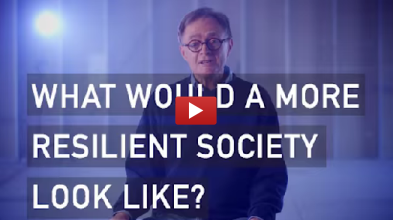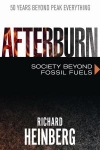MuseLetter #276 / May 2015 by Richard Heinberg
Download printable PDF version here (PDF, 139 KB)
This month’s Museletter starts out with my take on the contradictions behind the IMF’s new exposé on the extent of Global Energy Subsidies. Next up is my comment on the latest Bounding the Planetary Future report; and finally I’ve included links to the concluding two parts of the videos released in conjunction with my new book Afterburn: Society Beyond Fossil Fuels.
The IMF Tells a Half-Truth

On May 18 the International Monetary Fund (IMF) published a report titled “How Large are Global Energy Subsidies?” The question is a bit misleading: most readers, when they see the word subsidy, probably tend to think of tax breaks or cash gifts to specific industries. The report, however, uses the term mostly to refer to environmental externalities—and not ones tied to all energy use, but ones related to fossil fuel combustion in particular.
An economic externality is an impact of a commercial activity that is not reflected in the prices of goods or services traded. There can be positive externalities: if I buy organic, responsibly farmed food, I usually expect to pay more—thus the beneficial impact of my food choice upon the environment isn’t reflected in a price that would reinforce my behavior; just the opposite is true. But far and away most externalities are negative: companies are always looking for ways to make society as a whole clean up after them so that they don’t have to pay the full costs incurred by their activities. Indeed, John Michael Greer has convincingly argued that industrial capitalism is, in effect, a negative externality-generating machine: the faster it goes and the bigger it grows, the more externalities it spews out for society as a whole to try to mitigate.
It’s certainly helpful to have an accounting of the externalities of our collective fossil fuel consumption. But the choice of the word “subsidies” over the more precise “externalities” makes a difference: governments can cancel subsidies in the forms of tax breaks and gifts, but they can’t so easily cancel fossil fuel externalities without curtailing fossil fuel consumption—and that’s a big job, if they’re to do it in a way that doesn’t entail the rapid, uncontrolled collapse of society.
The take-away message of the IMF report for most readers would seem to be, “It costs us so much to burn fossil fuels ($10 million per minute, according to authors David Coady et al.) that we would save enormous sums by transitioning to alternative energy sources.” But there is a lot of long, hard work involved in actually doing that. An across-the-board energy transition can’t be accomplished with a simple policy declaration (the way a tax break can be rescinded, for example). The report notes that, of all nations, China has the highest externalized energy costs as a result of burning so much coal. But how else could China produce half the world’s steel and cement—with solar-powered blast furnaces and cement kilns? In reality, China can substantially reduce its energy-related environmental externalities only by shrinking its industrial output. It can nibble around the edges of the problem by shifting to more renewable electricity, but electricity is only about one-fifth of all energy consumed globally. And building massive numbers of solar panels and wind turbines would require a ramping up of high-temperature industrial processes (production of glass, steel, aluminum, cement, and silicon wafers) that currently rely on fossil fuels.
The IMF evidently wants policy makers to think fossil fuels are harmful and costly. Good: that’s true, and it’s helpful to know. It would be even better if this prestigious economic organization were to admit that eliminating the local pollution and global climate impacts of our current energy regime will require policy makers to do the very thing they least want to do: curtail and reverse economic growth. This in turn would probably entail redesigning financial and monetary systems so they do not require growth, supplementing GDP with quality-of-life indicators, rationing energy with a tradable quota system, enacting policies to gradually reduce population, and directing an ever-increasing share of continuing fossil fuel consumption to the industrial processes necessary to build the slower, more localized, renewable energy infrastructure of the future.
Evidently the IMF wants to spoon-feed its audience a little truth at a time. Only the easy bits are suitable now. It will save the hard truths for . . . when, exactly?
A Community Resilience Take on The Great Transition
A review of Bounding the Planetary Future: Why We Need a Great Transition by Johan Rockström.

(click to enlarge)
“Planetary boundaries” research constitutes an important advance in our ability to identify and quantify the components of global overshoot. Permit me to suggest that all presentations on planetary boundaries should include a discussion of Liebig’s Law—an ecological truism that can be boiled down to “a chain is only as strong as its weakest link.” We don’t have to wait for all nine boundaries to be transgressed before global calamity threatens; all it takes to shred the ecosystem web is for one boundary to be breached far enough, long enough. Seen in that light, the fact that four out of nine identified boundaries are already far behind us should be cause for profound concern.
Nevertheless, Johan Rockström’s exposition follows the familiar and necessary formula: industrial civilization is propelling us toward planetary collapse, but there is still time to change civilization’s operating system so as to ensure survival and well-being for everyone, even as population continues to grow. I have used that formula in essays and lectures any number of times, and, each time I do, I catch myself feeling just a bit disingenuous. Yes, as public intellectuals, it is our job to prescribe the medicine we think will improve the patient’s (i.e., civilization’s) condition. But is our prescription really capable of curing the disease?
Let’s face it: our patient’s condition is worsening. Further, we have seen cases like this before (i.e., there have been previous civilizations that overshot their environment’s carrying capacity), and in all instances, the outcome was dire. Nevertheless, following the discursive formula, a hypothetical treatment is proposed, consisting of energy substitution, massive resource efficiency improvements, wealth redistribution, and global governance; though it has never been tried, it seems to be our only hope.
A new school of environmentalist thought—sometimes labeled “doomerism”—holds that it is too late for such nostrums. The patient has no interest whatever in taking our medicine (sustainability proposals have been tabled at least since 1972’s Limits to Growth, but global elites have shown themselves completely uninterested in any course of action that does not promise continuing GDP expansion), and the disease is too far advanced (we have set in motion self-reinforcing geophysical processes that cannot be reversed). The most extreme doomers insist that near-term human extinction is now assured. Forget trying to save civilization, they say; think planetary hospice instead.
Doomerism has the virtue of willingness to look our predicament squarely in the face without flinching. But it has been criticized for underestimating the likely role of balancing feedbacks within both the environment and human society; further, it disempowers both its purveyors and its audience, who have a tendency to adopt an attitude of cynical, resigned apathy. Is there a third approach?
It seems to me we could start with a recognition that crisis is now assured. That does not mean near-term extinction is inevitable, but it does mean that this century will almost certainly see ecological, economic, and social upheaval on an unprecedented scale. The doomers are right in saying that it is late in the game, but wrong in simply giving up.
An alternative strategy would be to anticipate crises and use them to advantage. Such a crisis-led strategy would first seek to provide ways for people and institutions to adapt to coming changes in ways that create more community resilience and that meet basic human needs more sustainably over the long run. That would almost certainly imply different adaptive tactics for societies in varying stages of industrialization (or de-industrialization, as the case may be). A secondary strategy would be to widely and consistently publicize an ecological explanation for inevitable crises (overpopulation, depleting resources, pollution) that could at least partly reduce the social tendency to find scapegoats for declining economic conditions. This could avert a great deal of unnecessary conflict.
Crisis can be a teacher. All indigenous human societies eventually learned self-restraint, if they stayed in one place long enough. They discovered through trial and error that exceeding their land’s carrying capacity led to awful consequences. That’s why these peoples appear to us moderns as intuitive ecologists: having been hammered repeatedly by resource depletion, habitat destruction, overpopulation, and resulting famines, they eventually realized that the only way to avoid getting hammered yet again was to respect nature’s limits by restraining reproduction and protecting other forms of life. We have forgotten that lesson, because our civilization was built by people who successfully conquered, colonized, then moved elsewhere to do the same thing yet again—and because we are enjoying a one-time gift of fossil fuels that empower us to do things no previous society ever dreamed of. We have come to believe in our own omnipotence, exceptionalism, and invincibility. But we have now run out of new places to conquer, the best of the fossil fuels are used up, and the environmental consequences of burning them are starting to catch up with us. We can learn from crisis; cultural anthropology shows that. But, in this instance, we need to learn fast, and perhaps some organized effort to aid that process would be well spent. Planetary boundaries discourse could help explain to frightened masses why the world seems to be falling apart around them, while community resilience-building could help them adapt to changed conditions.
For the time being, most environmental activists will (and probably should) continue publishing new reports saying, “If we don’t change policies, terrible things will happen,” and, “If we do change policies everyone can live in peace and sufficiency.” I am merely suggesting that some of us might also be thinking strategically about what to do if world leaders do not adopt policies to drastically cut carbon emissions and redistribute wealth. Crisis-led community resilience seems to be the logical fallback plan.
AFTERBURN Video Series
In conjunction with the release of my new book ‘Afterburn’ we’re putting out a four-part video series. Click here to see the whole series. Please share them.
Use Discount Code PCI2015 for 20% off your purchase of the printed book.
![[Power book cover]](https://richardheinberg.com/wp-content/uploads/2021/03/cover_POWERcatalog-proof_300x450.jpg)



